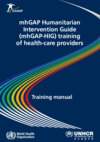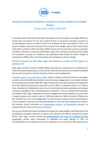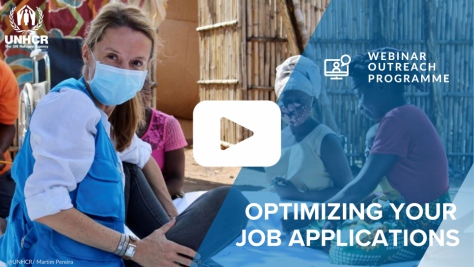A huge burden lifted as refugee restaurant owner gains Estonian citizenship
Karwan has worked hard to fit in, learning the language, making friends, finding employment, starting a family. It all paid off earlier this year.
TALLINN, Estonia, May 11 (UNHCR) - Karwan first passed through Estonia in 2003 when he was on the run from Iraq's Kurdistan region during the rule of Saddam Hussein and heading for Finland, where he had close relatives. Denied entry to Finland, immigration officers sent him back to Estonia.
It was not a warm welcome. He was handcuffed at the border and taken to a detention centre, where he was held for six months. But after being provided with subsidiary protection status in Estonia, he decided to try and start a new life in the capital Tallinn.
After struggling at first, 37-year-old Karwan has learned the language, made friends, found employment, married a girl from Georgia and started a family. In mid-February this year, he also became the first person allowed to stay on humanitarian grounds to be granted Estonian citizenship.
He has certainly worked hard to be accepted. "I have many friends here. With Estonians, I have never felt the attitude that I don't belong," he revealed, adding: "Now it's even better than before. Maybe it's because I speak Estonian and that makes them more forthcoming, more open to talk and communicate."
But things looked grim in 2003, when Karwan fled from his homeland to escape years of persecution and warfare. "I remember one night in the 1980s, when my mother woke me up and took me to the basement because the planes were coming [to bomb]," he recalled. "Our lives were in danger all the time."
His mother died in their mountain refuge, and talking about this brought back bad memories. "I still feel the cold and the hunger, and when we went back to the village I couldn't study anymore," Karwan recalled. In his mid-20s, he decided it was time to find a country where he would feel safe and could study in peace.
He made his way north through Turkey and the Russian Federation before ending up in Estonia. After being given international protection status, which allowed him to travel and work, Karwan rented an apartment and looked for a job.
It was a bit of a struggle, but he persevered and was hired by a car wash before finding work as a chef, making shashlik in a fast food restaurant. He eventually saved enough money to open his own restaurant in Tallinn almost exactly three years ago. "Our place is unique . . . We butcher our own meat and make fresh kebabs and falafel," Karwan proudly revealed.
His life revolves around the restaurant and his wife and two children, a boy aged seven years and a six-year-old girl. "A lot of my friends come to the restaurant to enjoy the food and have a chat. I really like their different backgrounds," he said.
But although he was well integrated, Karwan always felt something was missing until he became an Estonian citizen at a ceremony in Tallinn in February. "There was a huge burden on my shoulders, and now it was lifted," he told UNHCR. "Everything felt different, safer, better." The proud new Estonian celebrated with his family and staff. "I bought dessert for people here at work - a small party with food - and just sat and talked."
He's not completely out of the woods. His children are currently regarded as Iraqi, even though they were born in Tallinn. But Estonia changed its citizenship law at the start of this year and when it comes into force on January 1, 2016, beneficiaries of international protection will not have to prove that they have relinquished their former citizenship to obtain Estonian nationality.
This will help his children as well as other people given international protection (about 90 people in Estonia at the end of last year). Also in 2014, a total 143 new asylum applications were lodged, up 50 per cent on the year before, with the bulk coming from the Ukraine and Sudan. And 20 people were granted refugee status in Estonia last year.
Karwan, meanwhile, is looking forward to an even rosier future. "I love working here," he said, adding that he was thinking of opening a second restaurant.
By Salvador Merlos and Eero Janson in Tallinn, Estonia
Related news and stories
Twelve years on, Syrian refugees face deepening debt and hunger
UN Refugee Agency warns of extreme hardship for forcibly displaced families this winter
How Thailand's grassroots organizations are working to end statelessness
Iraqi doctor provides care and comfort to Yazidi survivors
Iraqi doctor provides care and comfort to Yazidi survivors
Yazidi women box their way to recovery
-

Statement on risks of trafficking and exploitation facing refugees from Ukraine attributed to UNHCR's Assistant High Commissioner for Protection
12 Apr 2022 The following statement is attributed to Gillian Triggs, UNHCR's Assistant High Commissioner for Protection -

MHPSS Annex of Public Health Strategy 2021-2025
11 Apr 2022 The Public Health Strategy 2021-2025 reaffirms the importance of public health in preparation for, and in response to, refugee emergencies addressing the main causes of morbidity and mortality. -

mhGAP HIG Training Materials
11 Apr 2022 The mental health Gap Action Programme (mhGAP) is a WHO programme that seeks to address the lack of care for people suffering from mental, neurological and substance use (MNS) conditions. The mhGAP-IG is a clinical guide for general health-care providers who work in non-specialized health-care settings, particularly in low- and middle-income countries. The mhGAP-HIG was developed in order to address specific challenges in humanitarian emergency settings. -

Résumé - Réunion d'information informelle et virtuelle sur le Pacte mondial sur les réfugiés
11 Apr 2022 -

UNHCR Country Strategy Evaluation: Zambia
11 Apr 2022 Zambia hosts the longest-standing refugee settlement in Africa, at Mayukwayukwa. It was established in 1966 and UNHCR has been actively engaged in the country since that time. As part of its 2020 workplan, UNHCR's Evaluation Service commissioned an independent evaluation team to conduct a Zambia country strategy evaluation for the period 2015 to 2020. The purpose of this forward-looking evaluation is to generate evidence to inform UNHCR's future operational planning and strategy in Zambia. The evaluation also aims to provide inputs into UNHCR Zambia's multi-year planning strategy beyond 2022. Attachments: Management Response and Annexes (.zip) -

UNHCR's Assistant High Commissioner lauds solidarity of Romania and the Republic of Moldova towards Ukrainian refugees
9 Apr 2022 -

Ukraine: How does cash assistance empower refugees?
8 Apr 2022 -

Optimizing Job Applications web
8 Apr 2022 -

Summary record - EC/73/SC/SR.1
8 Apr 2022

